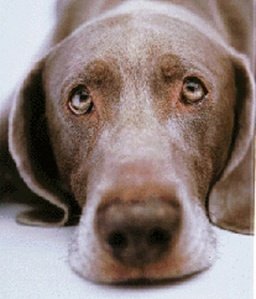Retinal Degeneration in Pets: Dogs & Cats
Causes Natural remedies Complementary care
Retinal degeneration refers to a number of progressive eye diseases that lead to blindness. When the disease comes on slowly it is referred to as Progressive Retinal Atrophy (PRA). Sudden Acquired Retinal Degeneration (SARD) can also develop spontaneously without any previously perceptible signs.
Retinal degeneration is not always easy to spot, but be aware if you pet displays any of these signs or behaviors: dilated pupils and more visible eye shine from the back of the eye; walking into objects, unwillingness to jump up onto objects, or reluctance to go outside; and poor vision in dim light or darkness.
Common Causes of Retinal Degeneration in Pets
Retinal degeneration is commonly believed to be an incurable genetic condition. Some studies relate the condition to inadequate nutrition in both dogs and cats and specifically taurine deficiency in cats.
Because it is an inherited disease, retinal degeneration is more likely to appear in certain breeds. In the breeds in which a genetic predisposition for this eye problem has been identified, both parents must carry an abnormal gene. Two parents who do not have the condition themselves may still pass on the disease offspring.
The sudden onset version of this disease (SARD) is not believed to be inherited and is not usually explained by previous history of exposure to toxins or signs of other diseases.
PRA, progressive retinal atrophy is one type of retinal degeneration, and one of our clients reports the following:
I have the Australian Cattle Dog with PRA (progressive retinal atrophy) and the results from the Cineraria and OcluMed eye drops have been miraculous to say the least....all cloudiness in her eyes disappeared completely within one week. I recommend your product to many dog and cat owners since I am a groomer/trainer and I also work at a veterinary clinic. Thank so much!
--T. J. Miller
ps...my dog, Bindi, is about to compete for her AKC Utility Dog title in June. Utility is the highest level of obedience in AKC. Good eyesight is a must as there is a hand signal exercise, a directional jumping exercise and a directional retrieve, all of which require she sees my hand signals from a distance. If is weren't for the eye products I get from you I seriously doubt she would be able to see well enough to even compete. Thank you, thank you, thank you!!!
Complementary Treatment

Because retinal degeneration is considered a genetic disorder neither afflicted animals nor their litter mates should be bred.
Since this condition so often results in blindness it is important to be aware of your pet's needs as the condition progresses. Cats generally adapt fairly well to life with diminished sight since they rely so heavily on their senses of smell and hearing. Dogs can cope with a loss of sight as well, but you should ensure that the home environment stays consistent and uncluttered; your dog can walk into furniture that has been moved or trip on unaccustomed objects left on the floor. Scent the areas at the top and bottom of household stairs with air freshener or other natural fragrances so that your dog can orient himself. Be sure that your dog still gets enough exercise as he may be more timid when outdoors than he once was and might be more prone to obesity due to inactivity.
The studies that do cite other potential causes of retinal degeneration besides genetic factors indicate that:
- Afflicted pets benefit from the DHA and DPA compounds in Omega 3 fatty acids
- Cats require supplemental taurine
Complementary Care
- Fatty acids Add a highly potent fatty acid blend rich in the Omega 3 constituents EPA and DHA to your pet's diet.
- Nutritional supplement to aid in general nutritional support. An aging pet's digestive system may not be absorbing what is needed.
- CoQ10
- Antioxidants and herbs that support eye health. Eyebright and bilberry are two herbs integral to holistic cataract treatment.
 info@naturaleyecare.com
info@naturaleyecare.com



 Home
Home

 Vision
Vision
 Health
Health Research/Services
Research/Services Pets
Pets

 About/Contact
About/Contact


